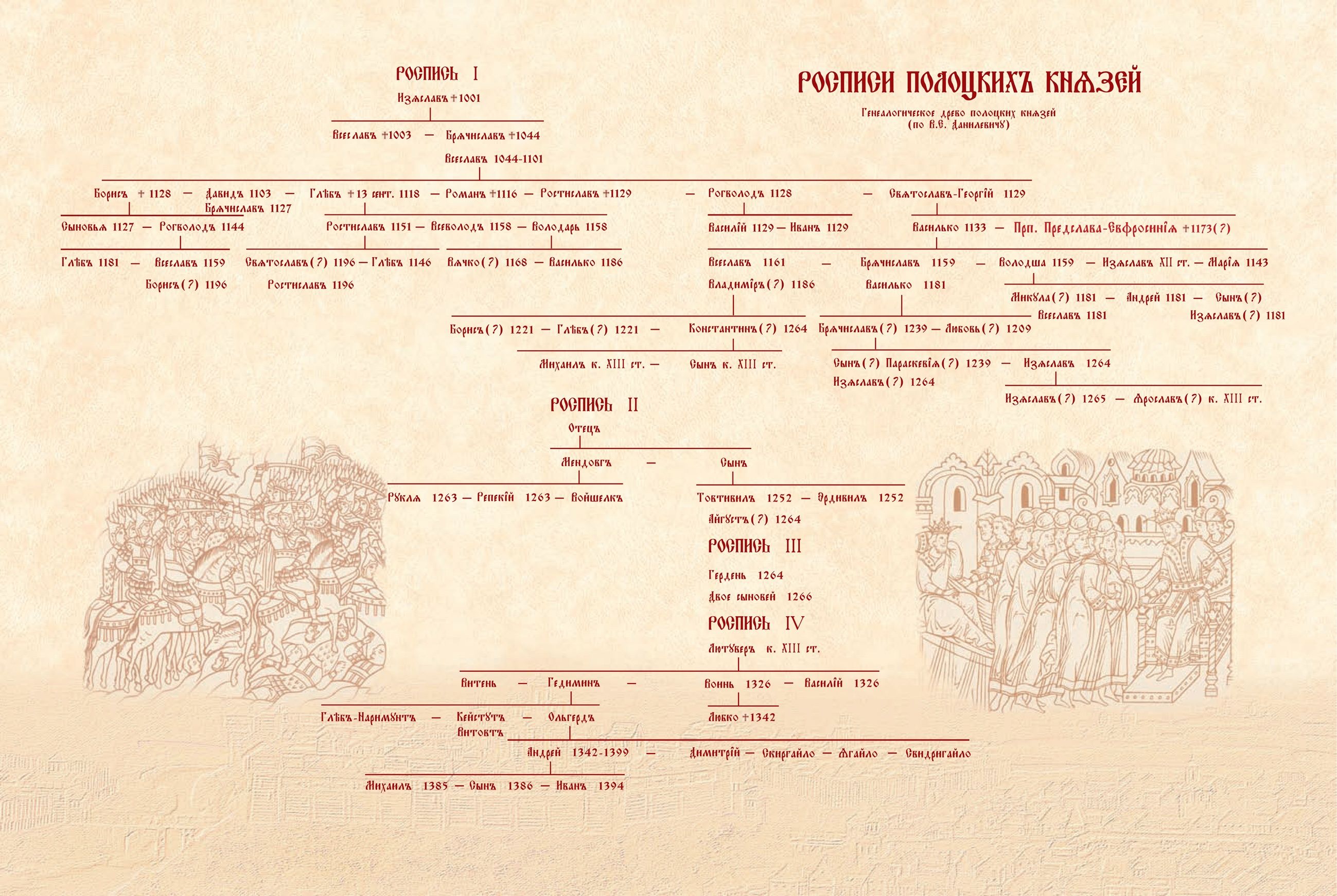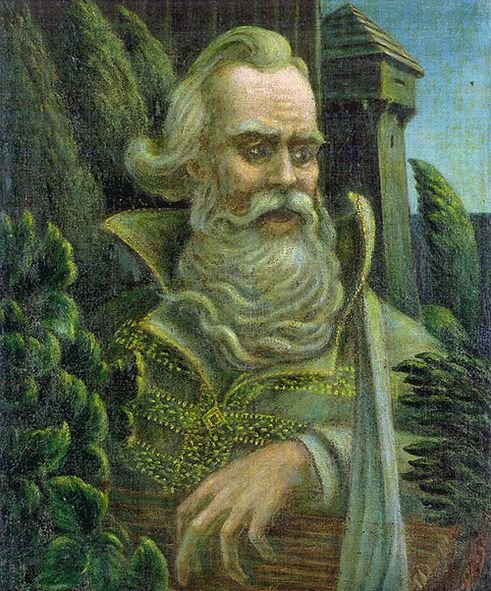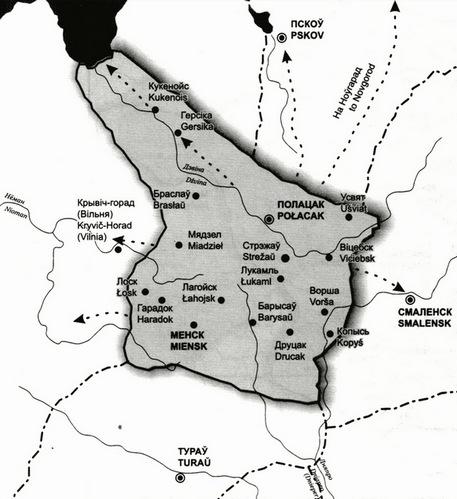The princely Rurik dynasty: the princes of Polotsk Izyaslavich.
Princely dynasty Rurikovich, rulers of Kievan Rus, and after its collapse, formed in this territory of the principalities, as well as the Moscow state until the end of the XVI century, originates from the half of the legendary Prince Varyag Rurik, who lived in the late IX century. Its famous representatives are the Kiev princes Igor Old (912-945 biennium), Svyatoslav the Brave (945-972 biennium), Vladimir I the Great (978-1015 biennium), Yaroslav the Wise (1016-1054 biennium) and others. However, starting with the sons and grandchildren of Yaroslav the Wise, the Rurik dynasty begins to divide into several branches. So there are princes "Monomakh", the descendants of Vladimir Monomakh of Chernigov princes of the ol'govichi, Turov-Pinsk princes Izyaslavich, Galician princes Rostislav and others.

But there was one of the princely branch of the Rurik dynasty is not associated with the name of Yaroslav the Wise. A dynasty of princes of Polotsk Izyaslavich (Aguadulce). Its the beginning of this dynastic branch takes from Izyaslav, son of the Kievan Prince Vladimir I the Great and Rogneda, daughter of the Polotsk Prince Rogvolod. Rogneda rejected the proposal of the then of the Novgorod Prince Vladimir to become his wife, but she answered proudly that ought not Princess to be a wife "robica", the son of a slave. Enraged Vladimir seized Polotsk and Rogneda took as a trophy. Needless to say, the relationship between the spouses was to put it mildly strained. There is a legend that Rogneda staged an attempt on her husband, which ended unsuccessfully. The Prince in fury, rushed at his wife, but in defense of the mother he got in the way of their son Izyaslav with sword in hand. As a punishment they were both banished to Izjaslavl. And in 989 Izjaslav received in the inheritance the Principality of Polotsk, where he ruled until his death in 1001.
Izyaslav had two sons, Brjachislav and Vseslav. Vseslav died while still a child, and bryachislav Izyaslavich inherited his father's Principality of Polotsk, which rules 1003. and until his death in 1044 Brjachislav led virtually independent from Kiev, politics, and even in the 1020 year attacked Novgorod, and expanded their holdings at the expense of the areas between the Gums and the Western Dvina. All these actions of the Prince of Polotsk led to conflicts with the Grand Prince of Kiev Yaroslav the Wise. Which after the attack Brjachislav to Novgorod, attacked his troops on the river Sudoma and broke them. Despite the fact that dynastic branch Izyaslavich of Polotsk is older than the branch "Yaroslav", the descendants of Yaroslav the Wise, the first never claimed the throne of Kiev. And only one representative of the iziaslavich dynasty happened to become the Grand Duke of Kiev for a short time. This person was the son Brjachislav Vseslav Polotsk.

After the death of Brjachislav in 1044, Vseslav of Polotsk became Prince and continued the policy of his father to expand their holdings. So during his reign to the Principality of Polotsk was annexed to the territory inhabited by Lithuanian tribes of Livonians, Curonians, Semigallians, Latgallians and SELA. In 1065 Vseslav raided Pskov, and in 1067 seized Novgorod. Grand Prince of Kiev Izyaslav Yaroslavych had to urgently gather troops to stop the burrowing nephew. Troops of the Kiev Prince managed to take Minsk, and then on March 3, 1067 to break Vseslav troops on the Nemiga river. Between Yaroslaviches and Vseslav began negotiations, during which Polotsk Prince along with his two sons were captured, taken to Kiev and thrown into prison.
And probably it would happen to sit Vseslav in prison until the end of the century, if there was no uprising in Kiev in 1068. Kiev expelled Prince Izyaslav, and Vseslav released from prison and proclaimed him the Grand Prince of Kiev. But rules in Kiev Vseslav only seven months, in 1069 Izyaslav with the support of Polish troops of king Boleslav II the Brave managed to expel him from the capital.
Vseslav began the struggle for their ancestral lands, the Principality of Polotsk in 1071 he manages to expel the son of Izyaslav, Svyatopolk. But in the same year of him from Polotsk knocks another son Izyaslav, Yaropolk. And only in 1072 Vseslav manages to finally establish itself in Polotsk. He continues to attempt to expand their holdings at the expense of lands of Kiev and makes trips to Smolensk and Chernigov in the year 1078. In retaliation, the Grand Prince of Kiev Vsevolod ravages a number of cities in the Principality of Polotsk, and his son Vladimir Monomakh in 1084 captures the city of Minsk. Apparently this was a severe blow to the power of the Polotsk Principality and its ruler, because from that time until his death in 1101, Vseslav no more foreign activity does not show.

Prince Vseslav Polotsk entered the Russian epic under the name of Volkhov of Vseslav'evich, the epic extols him as the Prince sorcerer, able to turn into different animals and birds. After the death of Vseslav Polotskoe Principality was divided into fiefdoms between his six sons: Roman, Gleb, David, Boris-Rogvold, Rostislav and Svyatoslav. That is, in the Principality of Polotsk continued the trend of crushing wealth as in the rest of Russia, and throughout Europe. Information about the sons of Vseslav came to us not very much.
Roman Vseslavich - 1101 year was the Prince of Polotsk, died in 1113, according to others in 1116.
Gleb Vseslavich - 1101 year was the Prince of Minsk. Gleb tried to continue his father's policy to expand its land holdings. So in 1116 he went to war on the land of Dregovichi, and in 1119 began to fight against Novgorod and Smolensk. But the forces were not equal. In the same year the troops of Gleb Vseslavich was broken, and he was taken to Kiev and placed in prison, where in the same year and died.
Davyd Vseslavich-data on where the rules of this Prince is not, there is a version that he did not get put.
Boris-Rogvold Vseslav'evich - aware of his campaign against the Yatvingians in 1102, and that in 1128, the year before his death Polotsk residents elected him as their Prince.
Svyatoslav Vseslavich-according to various historians was the Prince of either Vitebsk or Izyaslav.
Rostislav Vseslavich was one of the youngest sons of Vseslav, but there is no information about his possessions.
Vseslavich continued to clash with Kiev and the descendants of Yaroslav the Wise. So in 1129 for refusing to serve in a joint campaign against the Polovtsy, by order of the Grand Prince of Kiev Mstislav Vladimirovich the Great was captured by David, Svyatoslav, and Rostislav Vseslavich and sent to Constantinople, where they spent more than a decade.
Also known ten representatives of the next generation of the dynasty Izyaslavich.
1.Sons Gleb Vseslavicha: Rostislav (Prince of Polotsk and Minsk), Volodar (Prince of Minsk and Grodno), Vsevolod (Prince of Izyaslav), Izyaslav (Prince of Polotsk).
2.Sons Boris Vseslavich Rogvold: Rogvold-Basil (the Prince of Polotsk 1144-1151 years), John (no record of him there).
3.The sons of David: Brjachislav (Prince Lagassi and Iziaslav).
4.The sons of Svyatoslav: cornflowers (up to 1132 Prince Iziaslav, the Prince of Polotsk. 1132-1144), Vyachko (probably was Prince of Vitebsk), Davyd (information about his holdings there).
In the annals there is information also about ten representatives of the next generation Izyaslavich, great-grandsons of Vseslav: Gleb Rostislavich, cornflowers, Volodarevych, Vladimir Volodarevych, Gleb Rogvold-V., Vseslav Rogvold-V., bryachislav Vasilkovich, Vseslav Vasilkovich, Izyaslav Vasilkovich, Volodia Vasilkovich, Vsevolod Vasilkovich.
All these princes were owners of small estates and any important role in the history of Russia did not play. Also the Principality of Polotsk was divided into many principalities, and torn by internecine wars of their rulers in the second half of XI century has ceased to be an important political center of Russia. At the end of XII - the beginning of XII century the Polotsk Principality was captured by the Grand Duchy of Lithuania. And this time, dynastic branch Izyaslavich of Polotsk ceases to be observed at all.